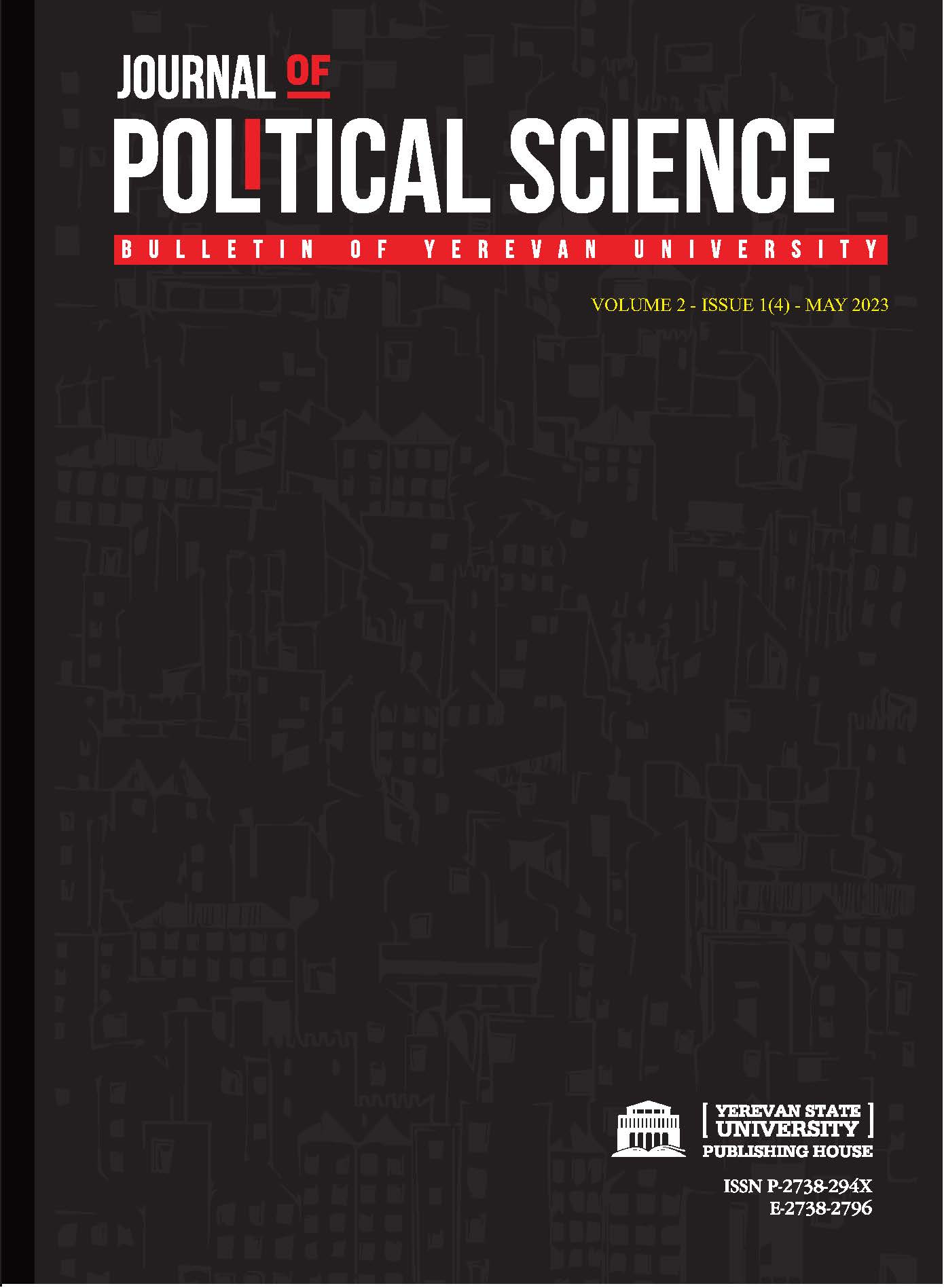Power to the Faculty Approach in the Bologna Process: How does the European Approach to accreditation of joint programs enhance innovation capacity?
Lessons learned from the Western Balkans for projects in the Eastern neighbourhood
DOI:
https://doi.org/10.46991/JOPS/2023.2.4.102Keywords:
Bologna process, European accreditation approach, Western Balkan, Europeanization, Erasmus plus, multilateral joint programs, European approach, European Political ScienceAbstract
The article analyses how the application of the new system for the accreditation of joint master’s programmes helps to improve the quality of training in accordance with requirements in the context of Europeanisation and globalisation of the educational space. The processes of democratization taking place in the European space, the active formation of public institutions, the strategy of integrating the countries of the Western Balkans and the Eastern Partnership into the European community, including the European educational space, put forward new requirements for higher education, in which the need to ensure a high quality of education is clearly visible, meeting European standards.
In the context of the formation of a knowledge society, higher education in the field of political science is becoming a priority in the development of the countries of the Eastern Partnership and the European Community. The development tasks of this sphere are ambiguous, manifesting themselves in complex and contradictory relations with society. Experiencing the influence of modern trends in social development, the sphere of higher education in the field of political science becomes at the same time their active participant, driving force and catalyst.
In an environment of growing globalisation, which is manifested in the intensification of competition on a global scale, there is a strengthening of the positions of the EU member states. The decisive factor in overcoming the secondary position of Europe in the market of educational services is the unification of the efforts of all European countries aimed at achieving the competitiveness of higher education. The embodiment of this idea is the Bologna Process, which aims to create a common European education area.
References
Asderaki, Foteini. 2020. “Researching the European Higher Education Area external effectiveness: regime complexity and interplay.” In: The Bologna Process and its Global Strategy: Motivations and External Responses, edited by Hannah Moscovitz, and Hila Zahavi, 39-56. Routledge.
Berndtson, Erkki. 2013. “Contradictions of the Bologna Process: Academic Excellence Versus Political Obsessions.” European Political Science 12: 440-447. https://doi.org/10.1057/eps.2013.24.
Corbett, Anne, and Mary Henkel. 2013. “The Bologna Dynamic: Strengths and Weaknesses of the Europeanisation of Higher Education.” European Political Science 12: 415-423. https://doi.org/10.1057/eps.2013.21.
Crosier, David, and Teodora Parveva. 2013. The Bologna Process: Its impact on higher education development in Europe and beyond. Paris, UNESCO: International Institute for Educational Planning.
Eurydice. 2020. The European higher education area in 2020: Bologna process implementation report. Luxembourg: Publications Office of the European Union. https://data.europa.eu/doi/10.2797/756192.
González-Ferrer, Amparo, and Laura Morales. 2013. “Do Citizenship Regimes Shape Political Incorporation? Evidence from Four European Cities.” European Political Science 12: 455-466. https://doi.org/10.1057/eps.2013.15.
Jongbloed, Ben, Jürgen Enders, and Carlo Salerno. 2008. “Higher education and its communities: Interconnections, interdependencies and a research agenda.” Higher Education 56: 303–324. https://doi.org/10.1007/s10734-008-9128-2.
Keeling, Ruth. 2006. “The Bologna Process and the Lisbon Research Agenda: The European Commission’s expanding role in higher education discourse”. European Journal of Education 41 (2): 203-223.
Klemenčič, Manja, and Pavel Zgaga. 2015. “Slovenia: The Slow Decline of Academic Inbreeding.” In: Academic Inbreeding and Mobility in Higher Education. Palgrave Studies in Global Higher Education, edited by Maria Yudkevich, Philip G. Altbach, and Laura E. Rumbley, 156-181. Palgrave Macmillan, London. https://doi.org/10.1057/9781137461254_7.
Klemenčič, Manja. 2020. “Introduction: 20 Years of the Bologna Process in a Global Setting: the external dimension of the Bologna Process revisited.” In: The Bologna Process and its Global Strategy: Motivations and External Responses, edited by Hannah Moscovitz, and Hila Zahavi, 1-5. Routledge.
Kok, Franz, und Markus Pausch. 2013. “„Bologna“ als Modernisierungsmotor oder Schreckgespenst im österreichischen Hochschulsektor.” In: FH2030 - Zur Zukunft der österreichischen Fachhochschulen, Herausgegeben von Reinhold Popp, und Elmar Schüll, 209-236. Wien, Berlin, Münster: LIT Verlag.
Krasner, Stephen D. 1982. “Structural Causes and Regime Consequences: Regimes as Intervening Variables.” International Organization 36 (2): 185-205.
Moscovitz, Hannah, and Hila Zahavi. 2020. “The Bologna Process as a foreign policy endeavour: motivations and reactions to the externalisation of European higher education.” In: The Bologna Process and its Global Strategy: Motivations and External Responses, edited by Hannah Moscovitz, and Hila Zahavi, 6-21. Routledge.
Münch, Richard. 2013. “The Bologna Process in the German System of Higher Education: From Occupational Monopolies to the Global Struggle for Educational Prestige.” European Political Science 12: 424-431 (2013). https://doi.org/10.1057/eps.2013.22.
Reinalda, Bob. 2013. “Introduction: How Does European Harmonisation Affect Political Science?” European Political Science 12: 409-414. https://doi.org/10.1057/eps.2013.20.
Savigny, Heather. 2013. “The (Political) Idea of a University: Political Science and neoliberalism in English Higher Education.” European Political Science 12: 432-439. https://doi.org/10.1057/eps.2013.23.
Schönwälder, Karen, and Irene Bloemraad. 2013. “Extending Urban Democracy? The Immigrant Presence in European Electoral Politics.” European Political Science 12: 448-454. https://doi.org/10.1057/eps.2013.14.
Zahavi, Hila, and Yoav Friedman. 2020. “The Bologna Process: an international higher education regime.” In: The Bologna Process and its Global Strategy: Motivations and External Responses, edited by Hannah Moscovitz, and Hila Zahavi, 22-38. Routledge.
Zgaga, Pavel, Manja Klemenčič, Janja Komljenovič, Klemen Miklavič, Igor Repac, and Vedran Jakačič. 2013. Higher Education in the Western Balkans: Reforms, Developments, Trends. Key Findings from Field Research. Ljubljana: Centre for Educational Policy Studies, Faculty of Education, University of Ljubljana.
Downloads
Published
Issue
Section
License
Copyright (c) 2023 Franz Kok, Günter Wageneder

This work is licensed under a Creative Commons Attribution-NonCommercial-ShareAlike 4.0 International License.



